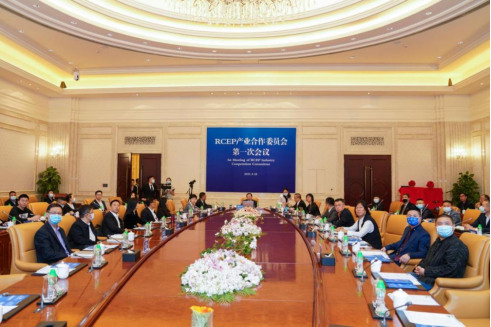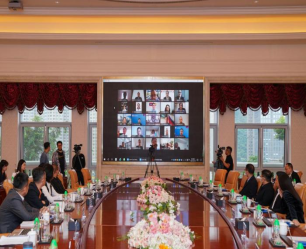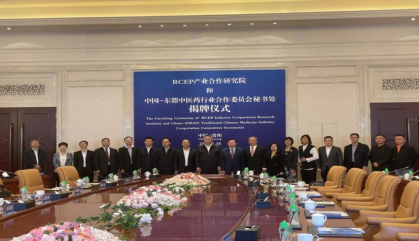The 1st RCEP Industry Cooperation Committee was Held

On May 18, the 1st RCEP Industry Cooperation Committee was held. In the consensus reached at the meeting, it was suggested that the business communities of RCEP members states should actively promote and participate in the construction of RCEP to jointly help realize the expected objectives of RCEP construction.
At the meeting, Xu Ningning, Chairman of the RCEP Industry Cooperation Committee and Executive President of the China-ASEAN Business Council, said in a keynote speech that raging pandemic is worrying people and also poses great challenges for the economic growth this year projected in the fourth quarter of last year. However, the increase in the number of vaccinated persons and the imminent entry into force of RCEP have strengthened our confidence in the economic recovery of this region.
Xu Ningning said that the imminent entry into of the RCEP agreement will not only bring about the joint development of the economies of the countries in the region, but also put forward urgent requirements for the enhancement of anti-pandemic cooperation among the countries in the region. The pandemic has caused a major impact on the industrial chain between countries, and RCEP has provided favorable conditions for industrial cooperation, industrial adjustment and upgrading among countries in the region. The emergence of the RCEP Industry Cooperation Committee meets the needs of the business communities to enhance cooperation.
At the meeting, Lv Kejian, Former Director General of the Department of Asian Affairs of the Ministry of Commerce of China; Francis Chua, Permanent Honorary Chairman of the Philippines Chamber of Commerce and Industry; Vikrom Kromadit, Chairman of the Thai-Chinese Business Council;Douglas Foo, Chairman of the Singapore Manufacturing Federation; IAI Tun, Myanmar Chinese Chamber of Commerce; Hakhee Jo, Vice President of the international affairs of Korea International Trade Association; Thanongsinh Kanlagna, Vice Chairman of the Lao Chamber of Commerce and Industry; Ju Dongying, President of the Japan-China Science &Technology and Culture Center; Tan Sri Dato'Soh Thian Lai, Chairman of the Federation of Malaysian Manufacturers; Yang Kun, Executive Director of the China Electricity Council; Oknha Chim Khean, Vice chairmanAssociation of Khmer Chinese in Cambodia; and Haris Chandra, Vice Chairman of the China Committee of the Indonesian Chamber of Commerce and Industry, etc. gave speeches and exchanged ideas and actively provided suggestions on the enhancement of cooperation between the business communities of RCEP countries.

More than 100 business representatives attended the meeting, which was chaired by Liu Xin, Executive Secretary General of the China-ASEAN Business Council and Secretary General of the RCEP Industry Cooperation Committee. After the 1st RCEP Industry Cooperation Committee, the unveiling ceremony of the RCEP Industry Cooperation Research Institute and the China-ASEAN Traditional Chinese Medicine Industry Cooperation Committee Secretariat was held.
In an interview with reporters during the meeting, Xu Ningning stated that the industries of RCEP's 15 member states are highly complementary. China and ASEAN are each other's largest trading partners. China has been ASEAN's largest trading partner for 12 consecutive years since 2009. Before 2019, ASEAN has been China's third largest trading partner for 9 consecutive years. In 2019, ASEAN has become China's second largest trading partner. In 2020, ASEAN has become China's largest trading partner. It has made two major strides in the past two years. In 2020, China’s direct investment in ASEAN's entire industry has increased significantly by 52%. At the same time, ASEAN’s actual investment in China has also increased. From January to April this year, China-ASEAN trade increased by 37% year-on-year, and ASEAN continues to be China's largest trading partner.

The following consensus have been reached at the 1st RCEP Industry Cooperation Committee:
1.RCEP is of paramount importance in the economic momentum of regional economies, economic cooperation amid the ongoing joint efforts against the COVID-19 pandemic, potential-tapping of regional growth via opening markets and even the global economic upsurge. The Committee, therefore, was founded, whose members are representatives from business communities of RCEP member states. The inauguration ceremony on April 16th, 2021 enjoyed the presence of representatives of economic authorities from most RCEP members, with the aspiration of all parties concerned for the Committee’s active role in industrial cooperation.
2.The top priority of RCEP is the early fulfilling of relevant countries’ domestic ratification for the tangible economic gains from RCEP at an early stage. Such an accomplishment will boost the confidence of the industrial and commercial sectors in their economic development and grant these circles and relevant bodies more time to prepare for market opening-up. In countries yet to fulfill this task, their business communities must strive to drive it.
3.RCEP members’ major chambers of commerce and industry could sketch action plans on cooperation with one another for the improvement of their international cooperation as well as information, channels, consulting and other services for businesses at home, giving full play to their role in RCEP. With such plans in place, concerns of businesses and industries grow more pronounced, favorable in setting key industries, projects and activities for cooperation. Concerns clear, cooperation could better boost efficiency in cooperation.
4.Relevant RCEP businesses shall master the contents of RCEP agreement coupled with its annex as well as all members’ product schedule of opening markets to prepare for tariff reductions in advance with the agreement. And their counterparts outside the RCEP region are suggested to heed this very agreement as well in an effort to seize the new business opportunities from such opening-up.
5.With the COVID-19 still raging worldwide, RCEP members are suggested to, with due recognition of the correlation between pandemic containment and mutual market opening, escalate their cooperation against the pandemic, which is conducive to the sound implementation. The above-mentioned communities should serve as major players in RCEP with contributions to such cooperation, to honor the RCEP objectives in synergy.
【图文来源于网络,如有侵权,请联系我们删除】


